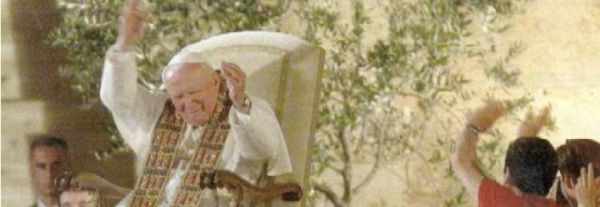2. Paul VI's apostolic exhortation Evangelii Nuntiandi reminds us that the first evangeliser is Christ himself.
Let us look in the light of today's liturgical pericope at what a day (and night) of Christ's evangelising activity looks like.
We find ourselves in Capernaum.
Christ leaves the synagogue and, together with James and John, goes to the house of Simon and Andrew. There he heals Simon's mother-in-law (Peter), so that she can immediately get up and serve them.
After the setting of the sun, "all the sick and the possessed are brought to Christ. The whole city was gathered before the gate" (Mk 1:32-33). Jesus does not speak, but performs the healing: "He healed many who were afflicted with various diseases and cast out many demons". At the same time, a significant remark: "he did not allow the demons to speak, because they knew him" (Mk 1:34).
Perhaps all this went on until late in the evening.
Early in the morning Jesus is already in prayer.
Simon comes with his companions, to tell him: "Everyone is looking for you" (Mk 1:37).
But Jesus replies: "Let us go elsewhere to the neighbouring villages so that I may preach there also; for this is why I have come" (Mk 1:38).
We read later: "And he went throughout all Galilee, preaching in their synagogues and casting out demons" (Mk 1:39).
3. In summary, based on that day, spent in Capernaum, it can be said that the evangelisation conducted by Christ himself consists of teaching about the kingdom of God and serving the suffering.
Jesus performed signs, and all of these formed the whole of a Sign. In this Sign, the sons and daughters of the people, who had come to know the image of the Messiah, described by the prophets and especially by Isaiah, can discover without difficulty that "the kingdom of God is at hand": he is the one who "has taken upon himself our sufferings, he has borne our sorrows" (Is 53:4).
Jesus does not only preach the Gospel as they all did after him, e.g. the wonderful Paul, whose words we meditated on just now. Jesus is the Gospel!
A great chapter in his messianic service is addressed to all categories of human suffering: spiritual and physical.
7. We read in today's Gospel that early in the morning Jesus persevered in prayer and Simon Peter came to him and said: "Everyone is looking for you".
As the distant successor of this Peter in the Roman See, I wish to repeat these words to Christ in the midst of your parish community: Lord, all seek you!
In these words you find confirmation, dear brothers and sisters, that you do "everything for the sake of the Gospel, in order to become sharers in it".
So be it!
[Pope John Paul II, homily 7 February 1982]












